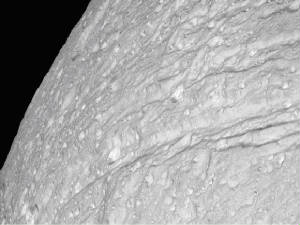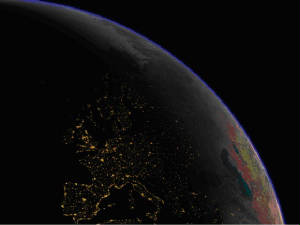|
|
 |
|
I grew interest in astronomy during my late years in elementary school. I read books about space and the universe; about black
holes and stars' life cycles. The ideas of a fourth dimension(space-time
) and the mathematics involved with lightspeed travel swarmed my thoughts almost every day. I enjoyed every day listening
to my teacher lecture and discuss his thoughts and ideas about space and the universe. By far one of my favorite classes ever.
Here are some examples of what I learned.
The surface of Saturn's moon Tethys is riddled with icy cliffs and craters. The above image was taken from about 32,000 kilometers
distant and shows a jagged landscape of long cliffs covered with craters. At the bottom of many craters appears some sort
of unknown light-colored substance. Tethys is one of the larger moons of Saturn, spanning about 1,000 kilometers across. The
density of Tethys indicates a composition almost entirely of water ice. Tethys is thought to have been predominantly liquid
sometime in its distant past, creating some of its long ice-cliffs as it cracked during freezing.
|
 |
|

an•ti•mat•ter n.
A hypothetical form of matter that is identical to physical matter except that its atoms are composed of antielectrons, antiprotons,
and antineutrons.
-----------------------------------------------------------------------------------------------------------
dark matter n.
Physical objects or particles that emit little or no detectable radiation of their own and are postulated to exist because
of unexplained gravitational forces observed on other astronomical objects. Dark matter is believed to be part of the missing
mass.
---------------------------------------------------------------------------------------------------------
dark matter
n : (cosmology) a hypothetical form of matter that is believed to make up 90 percent of the matter in the universe; it is
invisible (does not absorb or emit light) and does not collide with atomic particles but exerts gravitational force
---------------------------------------------------------------------------------------------------------
Main Entry: dark energy
Part of Speech: noun
Definition: in physics, a hypothetical force that affects the behavior of photons, counteracts gravity, and causes the universe
to expand at an ever-increasing rate
Example: Dark energy was first proposed by Albert Einstein to balance gravitation.
|
 |
|
|
|
 |
|

Europe at Night
Illustration Credit & Copyright: Planetary Visions Ltd.; Courtesy: Kevin M. Tildsley <BR>
The above digital fantasy of Europe at Night is a digital composite of archived satellite images taken both during the day
and night. This image is different from what an astronaut would see for reasons including a complete lack of clouds and an
unrealistic exaggeration of lights and contrasts. Even so, the geography underlying the image is captivating. Nighttime light
patterns have been accumulated from the USAF Defense Meteorological Satellite Program (DMSP) Operational Linescan System.
<BR>
|
 |
|
|
|
|
|
Enter supporting content here
|
|
|
 |

